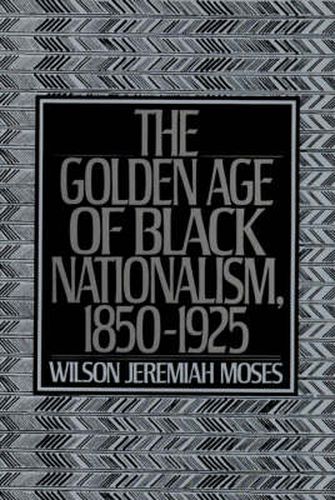Readings Newsletter
Become a Readings Member to make your shopping experience even easier.
Sign in or sign up for free!
You’re not far away from qualifying for FREE standard shipping within Australia
You’ve qualified for FREE standard shipping within Australia
The cart is loading…






The golden age of black nationalism began in response to the passage of the Fugitive Slave Act of 1850 and extended to the time of Marcus Garvey’s imprisonment in 1925. During these seventy-five years, an upsurge of back-to-Africa schemes stimulated a burst of literary output and nurtured the growth of a tradition that flourished until the end of the century. This tradition then underwent a powerful revitalization with the rise of Marcus Garvey and the ideological Pan-Africanism of W.E.B. Du Bois.
In this controversial volume, The Golden Age of Black Nationalism, Wilson Jeremiah Moses argues that by adopting European and American nationalist and separatist doctrines, black nationalism became, ironically, a vehicle for the assimilationist values among black American intellectuals. First providing the historical background to black nationalism and Pan-Africanism, he then explores the specific manifestations of the tradition in the intellectual and institutional history of black Americans. He describes the work of Alexander Crummell, W.E.B. Du Bois, Frederick Douglass, Booker T. Washington–specifically challenging the traditional interpretation of Washington as a betrayer of Douglass’ vision–and the National Association of Colored Women.
Moses also examines the tradition of genteel black nationalism in literature, concentrating on the novels of Martin Delany and Sutton Griggs, as well as the early poetry of W.E.B. Du Bois. Using literary history instead of literary criticism, he identifies the particularly Anglo-African qualities in these works. He concludes with a description of those trends that led to the decline of classical black nationalism at the time of the Harlem Renaissance and the New Negro Movement, which attempted to redefine the cultural and spiritual goals of Afro-Americans. Offering both a critical and sympathetic treatment of the black nationalist movement in the United States, Moses’ study will stimulate further debate concerning the nature of the assimilationist tendencies dominating black nationalist ideology in the golden age.
$9.00 standard shipping within Australia
FREE standard shipping within Australia for orders over $100.00
Express & International shipping calculated at checkout
The golden age of black nationalism began in response to the passage of the Fugitive Slave Act of 1850 and extended to the time of Marcus Garvey’s imprisonment in 1925. During these seventy-five years, an upsurge of back-to-Africa schemes stimulated a burst of literary output and nurtured the growth of a tradition that flourished until the end of the century. This tradition then underwent a powerful revitalization with the rise of Marcus Garvey and the ideological Pan-Africanism of W.E.B. Du Bois.
In this controversial volume, The Golden Age of Black Nationalism, Wilson Jeremiah Moses argues that by adopting European and American nationalist and separatist doctrines, black nationalism became, ironically, a vehicle for the assimilationist values among black American intellectuals. First providing the historical background to black nationalism and Pan-Africanism, he then explores the specific manifestations of the tradition in the intellectual and institutional history of black Americans. He describes the work of Alexander Crummell, W.E.B. Du Bois, Frederick Douglass, Booker T. Washington–specifically challenging the traditional interpretation of Washington as a betrayer of Douglass’ vision–and the National Association of Colored Women.
Moses also examines the tradition of genteel black nationalism in literature, concentrating on the novels of Martin Delany and Sutton Griggs, as well as the early poetry of W.E.B. Du Bois. Using literary history instead of literary criticism, he identifies the particularly Anglo-African qualities in these works. He concludes with a description of those trends that led to the decline of classical black nationalism at the time of the Harlem Renaissance and the New Negro Movement, which attempted to redefine the cultural and spiritual goals of Afro-Americans. Offering both a critical and sympathetic treatment of the black nationalist movement in the United States, Moses’ study will stimulate further debate concerning the nature of the assimilationist tendencies dominating black nationalist ideology in the golden age.